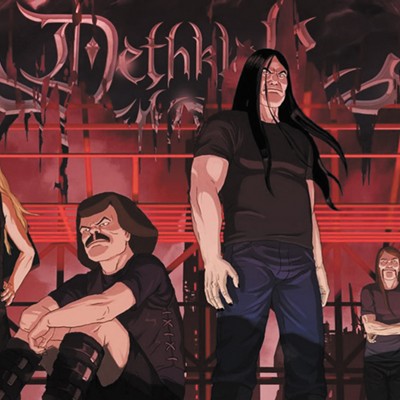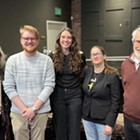No one is as surprised by Brett Hite's success as a musician as much as Brett Hite.
The son of athletic parents, the Spokane native played soccer through adolescence. After graduating from University High School, he attended the University of Washington on a soccer scholarship.
Degree in hand, Hite thought professional soccer might be his next step. He spent time with the Seattle Sounders organization (without a contract) and considered an offer from a team in Ohio. But tired of feeling like he was always recovering from an injury, Hite found himself at a crossroads.
"I was like 'What's the long-term plan here?'" Hite says. "Some of my buddies [were] in [Major League Soccer]. It's glamorous looking, but they're still making shit for money. I was like, 'If I'm going to be broke, I might as well go down [doing] the thing that holds my attention the most right now.' And that was music."
Hite said his parents had encouraged an interest in the arts, but weren't sure how to facilitate that interest. He took drum lessons when he was 7, then again when he started junior high.
Watching his friends play guitar at school, Hite's musical interests shifted. His mother and grandparents bought him a starter guitar that he spent hours playing after soccer practice. Hite's first concert, Amy Grant with his mother, didn't stoke an interest in performing. But something about seeing a friend's band at the Big Dipper — sounding "terrible and awesome all at once" — did.
After college, and still hooked on the idea of performing live, Hite moved to Los Angeles and started going to concerts nearly every night. Six months into attempting to figure things out, a bout of meningitis forced Hite to move home. This setback was a blessing in disguise, however, as he sat with his keyboard and guitar all day, every day.
Three years later, Hite decided to give LA another shot. This trip was more successful. While working at Lululemon, Hite met James Sunderland, his partner in the electro-pop/rock duo Frenship.
Before the pair talked music, they bonded over drinks after work. Hite said neither of them drink anymore, and they laugh about the "shenanigans" they got into.
"Throughout all that debauchery, we'd yell, 'There's big ships, little ships and the best ship is friendship!' and that was where the name came from," he recalls.
With their health in mind, Hite and Sunderland curbed their wild ways and wrote a few songs. The first, "Kids," received more of a response from friends and family than anything he or Sunderland had released separately. With a few more songs under their belts, the pair pursued a publishing deal, eventually clicking with Prescription Songs, and they began building a team of people they enjoyed writing with, including Emily Warren.
During one of their sessions with Warren, the trio, along with Scott Hoffman of Scissors Sisters, wrote "Capsize." Big-name artists like Rihanna considered recording the song, but it never made the final cut. After so much hurry-up-and-wait, Hite and Sunderland were at a breaking point as a band. They decided to release the handful of songs they had left and move on to other things. "Capsize" made the cut.
Upon release, the song quickly racked up more than 100 million Spotify streams before it was ever played on the radio. This caught the attention of Columbia Records, which signed Frenship and released 2016's Truce EP. "Capsize" currently has more than 630 million Spotify streams.
"Well, shit, for better or worse, we have a career now," Hite recalls thinking. "We always wanted that, but then in the end, it was a bit of an accident of how we actually became artists."
Lows often accompany those record business highs. Hite recalls having to be creative with his word choice when responding to a reporter asking about the economics of the music industry to avoid being sued by "Company X" for violating a nondisclosure agreement.
"We had a song that was top 10 on the global Spotify charts and it was multiplatinum throughout the world, and I was going to go buy a new car and I wanted a BMW X5, but I had to lease a Honda CRV," Hite told the reporter to explain how bad Frenship's record deal was.
"[Record deals] tend to not feel good at one point or another, so if you can at least enjoy the people that you're working with and make sure you're not completely getting screwed on the economic side of the deal, then it's at least a bit more sustainable," Hite adds.
Hite and Sunderland recently released the Base Camp EP through ONErpm. The EP, along with previously released songs like "All My Friends" and "How a Man Dies," marks an intentional move by Hite and Sunderland to be more vulnerable in their songwriting, something Hite says his Christian upbringing made it difficult to do as a younger musician.
"Early days we always wrote with some kind of optimistic, hopeful umbrella over everything," Hite says, noting his beliefs have shifted over time. "It was like 'Oh, I'm going through a hard time, but it's going to be fine.' Literally the lyrics of our biggest song is 'I'm fine.'"
On "Copenhagen," Hite and Sunderland sing about struggling with nationalism in the face of countless shootings across the country. On "Pretend" (which features King Henry), Hite was inspired to repeat "It'll be OK, it'll be OK" after watching their publisher try to comfort her son, who lives with brain tumors, as he experienced a seizure.
"I watched that and knew that she was talking to herself as well as him," Hite says. "It was such a heavy thing to witness. The next day we had this session, and I was like, 'There's nothing else that I can talk about right now.' ... These songs are written to accompany moments and to accompany people in these emotions. They're not necessarily written to solve them."
The freedom Frenship has felt in their songwriting has translated to the stage. At the end of the first leg of their current tour, Hite and Sunderland were forced to perform acoustically after the venue didn't have a piece of gear they needed to put on their show as previously planned.
Both left that concert thinking they could be on to something and are looking forward to bringing a more authentic show to audiences, performing as a two-piece and ditching the click track that dominated past shows.
"That's on us, with each other, to make sure that both of us feel safe to screw it up or to take it in a direction that we don't usually go to see how that feels," Hite says. "That's the exciting part to me is that it feels like we are in that space now." ♦
Frenship • Wed, Nov. 1 at 8 pm • $20 • 21+ • The District Bar • 916 W. First Ave. • sp.knittingfactory.com























